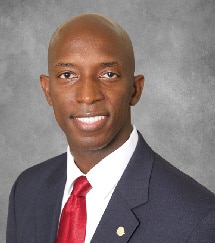Caribbean Leaders ready for climate change negotiations
Copenhagen, Denmark – On the eve of the first high-level consultation on Climate Change in Copenhagen, His Excellency Edwin Carrington, Caribbean Community (CARICOM) Secretary-General affirmed that CARICOM Heads of Government were “fully prepared” to represent the interests of the Community.
He was at the time speaking on December 15, 2009 at the Crown Plaza Hotel, Copenhagen, Denmark, at the Caribbean Community’s Side Event on Climate Change and Development at the United Nations (UN) Conference on Climate Change.
“Our heads of government do not come here empty-handed,” Mr. Carrington stated. He said that they had crafted their own Declaration on Climate Change back in July at their 30th Regular Meeting at Liliendaal, Guyana.
Preceding Copenhagen, the CARICOM Secretary-General said that Heads of Government were “central participants” in discussions at the UN Secretary-General’s Summit on Climate Change in September, and at the Commonwealth Heads of Government Meeting in November.
Moreover, he said that CARICOM’s interests had been represented in other fora by officials, who had expended “tireless efforts” to prepare the Community for the “vital role it has been playing and continues to play in the ongoing deliberations for a global agreement on climate change.”
In this regard, Mr. Carrington acknowledged the role of the Caribbean Community Centre on Climate Change (CCCCC); the contributions of universities in the Region; and of other policy research agencies, in helping the Community understand the issues related to climate change.
Those efforts in paving the way towards Copenhagen allowed the Region to make its case “based on solid empirical information,” the Secretary-General stated.
“The gravity of the threat of climate change to the survival of the Caribbean cannot be overstated. However, on the basis of the latest scientific information, climate change is a problem that can be solved. The technologies required are largely available today and the costs are manageable—even in the current economic climate, but we have to act without delay before it is too late,” he added.
Mr. Carrington pointed to current efforts within the Community towards the use of renewable energy and other elements towards climate change adaptation and mitigation. He highlighted: Geo-thermal endowments of St. Kitts/Nevis and Dominica; the hydropower supplies and potential of Suriname, Belize, Jamaica, Dominica and Guyana; the impressive and expanding Wigton wind-farm in Jamaica; the solar photovoltaic stand-alone systems in rural Guyana and Belize, the solar water heater industry, which began in Barbados; the biomass readiness of Guyana and Belize; the significant standing forests of Guyana Suriname and Belize, and the commitment to renewable energy by CARICOM oil-producing countries – Trinidad and Tobago, Suriname, Belize, and Barbados.
These strategies, the Secretary-General observed, “bodes well for an appropriate response to the Climate Change threat to CARICOM Member States.”
With the curtain now raised on the United Nations Conference on Climate Change, Mr. Carrington stated that the Community was “ready to contribute … not only in Caribbean interests, not only in AOSIS Countries’ interests; not only even in the developing countries’ interests; but in defence of the one planet we all must share.”


